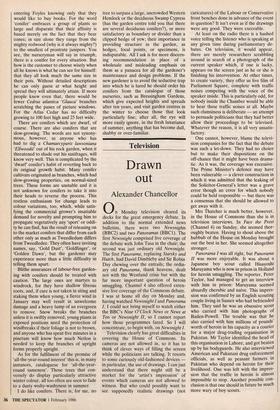Television
Drawn out
Alexander Chancellor
0 n Monday television cleared its decks for the great emergency debate. In addition to the normal extended news bulletins, there were two Newsnights (BBC2) and two Panoramas (BBC1). The first Newsnight comprised live coverage of the debate with John Tusa in the chair; the second was just ordinary old Newsnight. The first Panorama, replacing Starsky and Hutch, had David Dimbleby and Sir Robin Day chewing over the entrails; the ordin- ary old Panorama, thank heavens, dealt not with the Westland crisis but with the far more important question of heroin smuggling. Channel 4 also offered exten- sive live coverage of the Commons debate. I was at home all day on Monday and, having watched Newsnight I and Panorama I, I could not bring myself to watch either the BBC's Nine O'Clock News or News at Ten or Newsnight II, so I cannot report how those programmes fared. So I will concentrate, to begin with, on Newsnight I.
Television clearly has great difficulties in covering the House of Commons. Its cameras are not allowed in, so it has to think of clever ways of filling the screen while the politicians are talking. It resorts to some curiously old-fashioned devices in particular, the use of drawings. I can just understand that there might still be a market for the 'artist's impression' of events which cameras are not allowed to witness. But who could possibly want to see supposedly realistic drawings (not caricatures) of the Labour or Conservative front benches done in advance of the event in question? It isn't even as if the drawings were any good. They were execrable.
At least on the radio there is a hushed voice telling the listener who is speaking at any given time during parliamentary de- bates. On television, it would appear, there are merely researchers scrabbling around in search of a photograph of the current speaker which, if one is lucky, appears on the screen just as he or she is finishing his intervention. At other times, to create variety, they offer us live film of Parliament Square, complete with traffic noises competing with the voice of the speaker inside. This is particularly odd, for nobody inside the Chamber would be able to hear these traffic noises at all. Maybe such clumsiness is deliberate — an attempt to persuade politicians that they had better allow their proceedings to be televised. Whatever the reason, it is all very unsatis- factory.
One cannot, however, blame the televi- sion companies for the fact that the debate was such a let-down. They had no choice but to make their dispositions on the off-chance that it might have been drama- tic. As it was, the coverage was excessive. The Prime Minister's defence may have been vulnerable — a clever construction in which it was admitted that the leaking of the Solicitor-General's letter was a grave error though an error for which nobody could be held responsible — but there was a consensus that she should be allowed to get away with it.
Mrs Thatcher is much better, however, in the House of Commons than she is in television interviews. In Face the Press (Channel 4) on Sunday, she seemed thor- oughly beaten. Having to shout above the hubbub of the House on Monday brought out the best in her. She seemed altogether stronger.
Panorama I was all right, but Panorama II was more enjoyable. It was about a Japanese boy scout called Hisayoshi Maruyama who is now in prison in Holland for heroin smuggling. The reporter, Peter Taylor, had managed to get an interview with him in prison: Maruyama seemed absurdly cherubic and naive. This impres- sion was confirmed by an English scouting couple living in Sussex who had befriended him. They said he was an obsessive scout who carried with him photographs of Baden-Powell. The trouble was that he also carried with him millions of pounds' worth of heroin in his capacity as a courier for a major drug-trading organisation in Pakistan. Mr Taylor identified the head of this organisation in Lahore, and got beaten up by his bodyguards. He also interviewed American and Pakistani drug enforcement officials, as well as peasant farmers in Pakistan who depend on heroin for their livelihood. One was left with the impres- sion that the traffic in heroin is almost impossible to stop. Another possible con- clusion is that one should in future be much more wary of boy scouts.














































 Previous page
Previous page